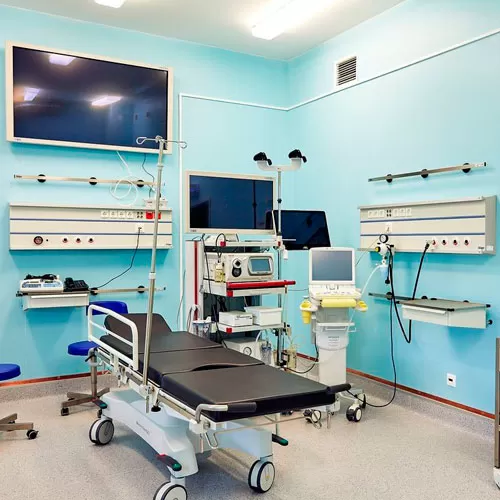
Esophagogastroduodenoscopy (EGD) + biopsy The procedure is performed transorally, or subject to certain indications, through the nose.
Endoscopic polypectomy (of the esophagus, stomach or duodenum)
INDICATIONS FOR THE EXAMINATION
EGD is a technique of examining of the mucous lining of esophagus, stomach and duodenum with the use of a flexible endoscope to diagnose various inflammatory diseases, erosion and ulcerative lesions, and identification of benign neoplasms and oncopathologic conditions.
WHAT IS THE PROCEDURE OF ESOPHAGOGASTRODUODENOSCOPY?
EGD is performed using advanced endoscopic equipment which features virtual chromoscopy capabilities (NBI and i-SCAN modes) to obtain detailed images for the detection of early-stage endoscopic evidences of disorders.
Apart from standard EGD, there is also transnasal EGD.
During an EGD procedure, biopsy is also performed (involving the detection of the Helicobacter pylory bacteria).
Videoduodenoscopy + biopsy
This is an endoscopic technique for the diagnostics of pathologies of major duodenal papilla, minor duodenal papilla and the duodenum. The procedure is performed using a special endoscope which has lateral optics to pinpoint major duodenal papilla and minor duodenal papilla, and, if required, to perform a biopsy.
Transcutaneous endoscopic gastrostomy
The procedure is minimally invasive, and is performed jointly by surgeons and endoscopists on patients that are unable, due to various reasons, to take food orally (neurologic disorders, obstruction of the oral cavity or upper digestive tract with a tumor, etc.) and require prolonged enteral feeding. This procedure is only performed at surgical inpatient facilities
Endoscopic polypectomy (of the esophagus stomach, duodenum or the great gut)
The Center employs the following two procedures:
- “cold snare” polypectomy;
- galvanocaustic snare polypectomy;
- endoscopic resection of the mucous lining (EMR)
- endoscopic submucosal dissectio (ESD);
- argon plasma coagulation (APC).
CONTRAINDICATIONS:
- severe chronic cardiac insufficiency.
- disorders of the esophagus that make it impossible to use endoscope;
- generally threatening condition of the patient.
PREPARING FOR THE TEST
- Refrain from eating for 12 hours before the examination.
- At the day of the examination, smoking and taking medication is only allowed after the examination.
Please note: patients overweight must first come for a consultation with an anesthesiologist 2-3 days before the study.
If your body mass index is (BMI) >35, the examination under anesthesia will not be.
BMI = weight (kg) / height2 (meter)
HOW CAN I GET THE PROCEDURE OF ESOPHAGOGASTRODUODENOSCOPY AT THE RCMC
To be eligible for the examination, the patient must have a physician’s referral
- Please call the Contact Center and book an appointment for the examination
- You need to complete and sign a paid service contract at the Reception (present a physician's referral to the receptionist)
- Pay the bill at the RCMC pay office, or through the ERIP electronic system
- Get the examination at the appointed time.



